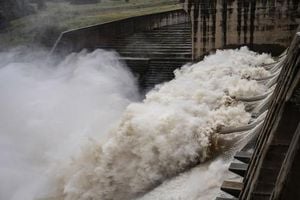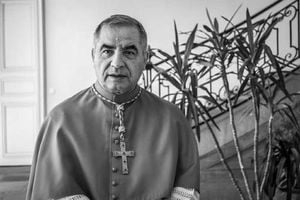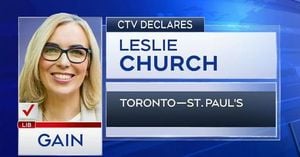In a stunning turn of events during the Canadian federal election held on April 28, 2025, Conservative Leader Pierre Poilievre is projected to lose his own seat in the Ottawa-area riding of Carleton. Despite his party achieving its best electoral performance since 2011, Poilievre's defeat at the hands of Liberal candidate Bruce Fanjoy marks a significant shift in the political landscape.
According to projections from the Canadian Broadcasting Corporation (CBC), Poilievre, who has represented Carleton for two decades, faced a robust challenge from Fanjoy, who claimed to have garnered substantial support from local residents over the past two years. In his victory speech, Fanjoy expressed his lack of surprise at the outcome, stating, "The people of Carleton were looking for serious leadership." He emphasized that voters were dissatisfied with the divisive politics associated with figures like Donald Trump, whose tariffs were a key issue during the campaign.
As the election results began to unfold, Prime Minister Mark Carney, who is projected to lead the Liberals to another term, delivered an impassioned victory speech. "Who is ready to stand up for Canada with me?" he shouted to a cheering crowd, pledging to govern for all Canadians. Carney’s government will likely need to collaborate with other parties to pass legislation, as the final composition of the House of Commons remains uncertain due to several ridings still too close to call.
In a notable twist, Poilievre, despite losing his seat, has stated he has no intention of stepping down as party leader. He pointed to his party's highest projected vote share since 1988, indicating a strong base of support remains. "We have to learn the lessons of tonight so that we can have an even better result the next time," he remarked, suggesting a commitment to continue his political journey.
The election also saw the New Democratic Party (NDP) leader Jagmeet Singh concede his own riding and announce his resignation as NDP leader after the party's support dwindled nationwide. Singh expressed his disappointment, stating, "We may lose sometimes and those losses hurt," signaling a significant shift in the party's fortunes.
As of the morning of April 29, 2025, the projected seat count stood at 168 for the Liberals, 144 for the Conservatives, 23 for the Bloc Québécois, and just 7 for the NDP, with the Green Party holding 1 seat. The threshold for a majority government is 172 seats, leaving the Liberals just shy of that mark. The results indicate that while the Liberals have regained some ground, they will need to negotiate with other parties to achieve a stable government.
In Ontario, the Liberals won or led in 69 ridings, while the Conservatives secured 53. Notably, the Conservatives flipped six previously Liberal seats in the 905 area surrounding Toronto, a region critical to federal election outcomes. The party achieved 44.5 percent of the vote in Ontario, a significant improvement from previous elections.
Meanwhile, the Bloc Québécois has seen its projected seat count drop from 35 to 23, reflecting a shift in voter sentiment in Quebec. Bloc leader Yves-François Blanchet acknowledged the unusual nature of the election and called for stability among Quebec voters, emphasizing the need for cooperation among federal parties.
As the counting of special ballots resumed on April 29, Elections Canada indicated that these ballots could play a pivotal role in determining the final results in several key ridings that remain too close to call. The special ballots are expected to influence the overall seat distribution, particularly in regions where the margins are tight.
Carney's campaign was marked by a focus on unity and governance for all Canadians, contrasting sharply with the divisive rhetoric often associated with Trump. The American president's threats to Canadian industries loomed large over the campaign, with Carney occasionally stepping away from the trail to address these issues directly.
In the wake of the election, political analysts are already speculating on the implications for Poilievre's leadership and the future of the Conservative Party. While losing a seat can place pressure on a party leader to resign, historical precedents exist where leaders have continued to lead without a seat in the House of Commons, as seen with former prime ministers Stephen Harper and Jean Chrétien.
As the dust settles on this election, the political landscape in Canada is poised for significant changes. The results reflect a desire among voters for stability and effective governance, while also indicating a potential shift in party dynamics as leaders reassess their strategies moving forward.
With the election results still unfolding and many ballots yet to be counted, Canadians are left to ponder the future direction of their government and the implications of this pivotal election. The coming days will be critical as the final seat counts are confirmed and the new government prepares to take shape.




